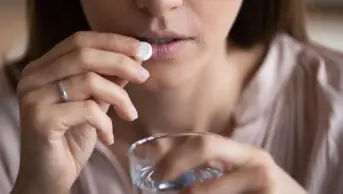
Shutterstock.com
Psilocybin therapy appears to be at least as effective as escitalopram in treating depression, findings from a small phase II study published in the New England Journal of Medicine have indicated (15 April 2021)[1].
Researchers compared two sessions of psychedelic psilocybin therapy, delivered in a specialist clinical setting, with a course of the selective serotonin reuptake inhibitor, escitalopram.
Volunteers with long-standing, moderate-to-severe major depressive disorder were randomised to receive either two 25mg doses of psilocybin three weeks apart plus six weeks of daily placebo (n=30), or two 1mg doses of psilocybin three weeks apart plus six weeks of daily escitalopram (n=29).
Participants were assessed using standardised scales of depressive symptom severity. The primary outcome of the trial was the change in score on the Quick Inventory of Depressive Symptomatology – Self Report (QIDS-SR-16), a standardised 16-question survey used to score people on self-reported symptoms of depression, at week six.
Depression scores were reduced in both groups from baseline — -8±1 for psilocybin and -6±1 for escitalopram — but the change in QIDS-SR-16 score did not differ significantly between the two groups (between group difference of 2.0 points [95% confidence interval -5.0 to 0.9], P=0.17). Secondary outcomes, including measures of anxiety and feelings of wellbeing, generally favoured psilocybin over escitalopram.
Remission rates — measured as a score of 0–5 at week six — were twice as high in the psilocybin group than the escitalopram group (57% vs 28%).
“One of the most important aspects of this work is that people can clearly see the promise of properly delivered psilocybin therapy by viewing it compared with a more familiar, established treatment in the same study,” said Robin Carhart-Harris, head of the Centre for Psychedelic Research at Imperial College London.
“Psilocybin performed very favourably in this head-to-head.”
- 1Carhart-Harris R, Giribaldi B, Watts R, et al. Trial of Psilocybin versus Escitalopram for Depression. N Engl J Med 2021;384:1402–11. doi:10.1056/nejmoa2032994


